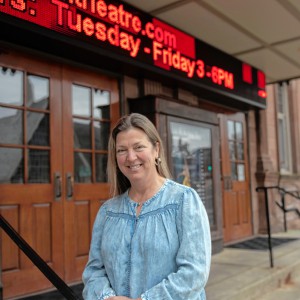Valley Bounty: Put the market where the people are
| Published: 01-12-2023 2:06 PM |
‘I’m a junkie for rutabagas,” admits Cathleen O’Keefe. “I love their tanginess and making fries with them. And winter greens. Knowing what goes into growing them in New England in the winter — they’re amazing!”
O’Keefe has owned and managed the Winter Farmers Market at the Hampshire Mall in Hadley (formerly the Amherst Winter Farmers Market) with her characteristic enthusiasm for seven years now, and it’s easy to see how her excitement is fed by the atmosphere of the market and the community it inspires. Located in the mall’s Target hallway, it offers a social bright spot and a splash of local flavor most Saturdays, from 10 a.m. to 2 p.m., through the end of March.
“Our primary focus is supporting local farmers,” O’Keefe explains, “but as a winter market we have space for artisans as well.”
Farm vendors offer everything from local veggies, meat, dairy and eggs, to tender greens and mushrooms. Others sell jam, wine, honey and freshly baked bread. A plethora of local crafters sell jewelry, ceramics, soaps, teas, herbs, fiber, clothing and artwork. And all this happy cacophony unfolds each weekend.
O’Keefe’s experience farming, event planning, and working as a theater stagehand suits her well for managing a business that’s as much about social connection as it is about food. Upon entering this new role, moving the market to the Hampshire Mall was her first big decision, and existing vendors and customers were in strong support. The idea was simple: If you want more people to come to the market, put the market where the people are.
“It was a shock to some people,” she says. “It’s an unconventional space. But it means we’re constantly interacting with people who aren’t your typical farmers marketgoer. Every week I hear, ‘Wow! A farmers market!’”
“There’s work to be done to get those people to stay regular farmers market customers,” she adds, “but it’s exciting to have that new energy every week. And I think the juxtaposition of our location is sort of great. It’s a less privileged and exclusive-feeling space to be in, which ultimately is the experience we want to create.”
Besides improving market access by making their space feel inclusive, O’Keefe points out that they’re located directly on PVTA’s B43 bus route between Amherst and Northampton. Many farm vendors also take payment via SNAP and HIP (Healthy Incentives Program) benefits, lowering some financial barriers.
Article continues after...
Yesterday's Most Read Articles
HIP is a Massachusetts program that offers an instant rebate of SNAP benefits spent on local produce bought directly from participating farms or at local stands and markets, from $40 to $80 per month depending on household size. People get fresh, healthy fruits and veggies at no cost, and local farms are able to sell their food to more people — a win-win.
“HIP is such an amazing program,” O’Keefe says, “and every week I get to explain these benefits to people who are new to it. There are other grocery stores right down the street, but none of those places can accept the HIP rebate.”
Farmers markets come in many shapes and sizes. Some are run by non-profits, municipalities, or volunteers. Others are technically owned and operated as private businesses, as O’Keefe owns the Winter Market at the Hampshire Mall. No matter the legal distinction, the majority are a true labor of love — mission-based organizations with extremely slim margins.
“I do have the support of the wonderful folks at CISA (Community Involved in Sustaining Agriculture), who connected us with Dave’s Natural Garden for this season, for example,” O’Keefe says. “Then there’s Mass Farmers Markets, the Agriculture and Transitional Assistance Departments at the state and other market managers too. I’m thankful to have that network of people who are experiencing the same joys and struggles.”
On Saturday mornings, it’s mostly her joy that’s on display. And not just for rutabagas.
The breadth of local produce grown year-round by Massachusetts farmers “blows my mind,” O’Keefe says. “And you can’t beat local eggs, they’re so flavorful with bright orange yolks. I don’t buy all my groceries here, but I try to supplement what I’m eating with things from the market. And I think that’s something a lot of us can do.”
Over in the crafts section, “beeswax candles just have this smell of August!” she exclaims. “That’s what excites me about winter market – it keeps your senses alive during the darkest days of the year. That and seeing all these people in the middle of winter, coming together to celebrate what we have.”
“Job creation, income for these farmers and artisans, and making real connections with people – this is the real power and beauty of farmers markets,” she says. “And that’s why I run the market.”
The Winter Farmers Market at the Hampshire Mall happens every Saturday from 10 a.m. to 2 p.m. in the Target hallway, now through March 25, except for Jan. 14 and 28. To learn more about all 12 winter farmers markets operating in the Valley this winter, visit CISA’s online guide to local food and farms at buylocalfood.org/find-it-locally.
Jacob Nelson is communications coordinator for CISA.

 A DIY approach to flying: Local pilots build and help build their own aircraft
A DIY approach to flying: Local pilots build and help build their own aircraft You’re up next: Western Mass open mic scene heats up post-pandemic
You’re up next: Western Mass open mic scene heats up post-pandemic One upon a story slam: This year’s Valley Voices winners head to a final competition
One upon a story slam: This year’s Valley Voices winners head to a final competition Preserving a key part of Emily Dickinson’s legacy: Historic Evergreens house reopens at the Emily Dickinson Museum
Preserving a key part of Emily Dickinson’s legacy: Historic Evergreens house reopens at the Emily Dickinson Museum